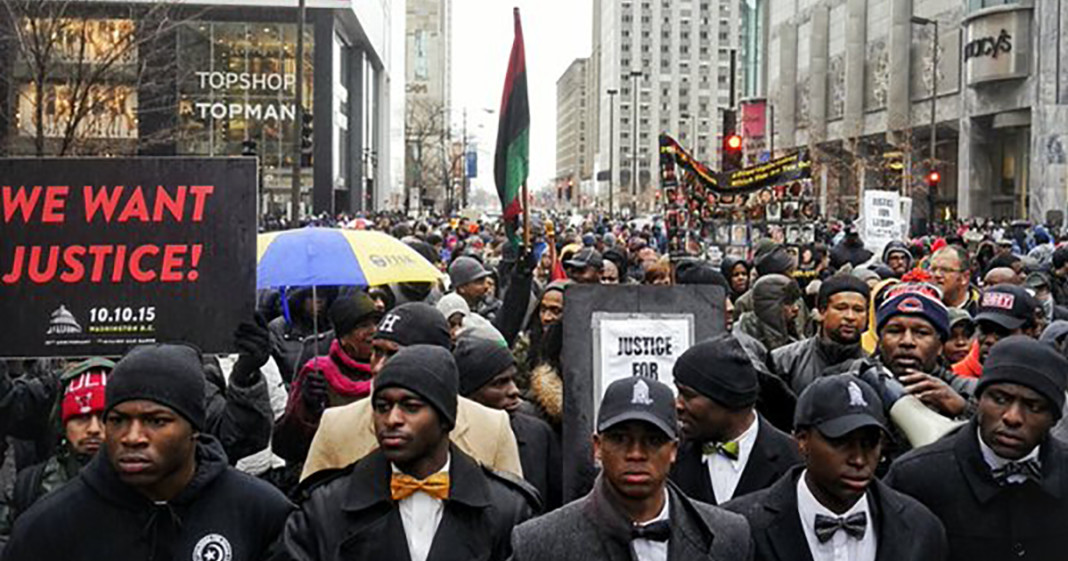It has been well over a year since the killing of 17-year-old Laqaun McDonald by Officer Jason Van Dyke of the Chicago Police Department. Recently, a judge ordered the Chicago P.D. to release video taken from a cruiser dash camera to the public after a lengthy court battle. It shows the boy being shot numerous times in what appears to be an “execution style” killing.
Now that the video footage has been made public, a new round of protests against the police killings of African-Americans has begun – and the opening demonstration wound up shutting down Chicago’s “Magnificent Mile,” putting a major crimp in the year’s biggest holiday shopping day. The rally was led by the Reverend Jesse Jackson and other Illinois leaders in order to protest not only the McDonald murder, but the entire issue of racial bias and profiling that has led to the deaths of nearly 800 African-Americans this year alone.
On Black Friday, protesters swarmed Chicago’s biggest commercial retail area on Michigan Avenue. The timing was not a coincidence. Given the hordes of holiday shoppers out and about that day, those who planned and led the rally realized that it was a huge opportunity to bring the issue of police brutality and racial profiling to the forefront, by applying pressure where it was likely to have the greatest impact: the bottom line. Protesters chanted, “We lose our children, we make you lose money!” Although protesters were prevented from entering retail stores by police, they managed to keep some shoppers from entering. One protester told a local news reporter, “The fact that all of us need to be here shutting down commerce in order to maybe get people to think that black lives are important, as everyone else is, is really sick!”
Yet, it seemed to be the best way to finally get the public’s ear on an issue they feel has been ignored for far too long. Reverend Marshall Hatch of the New Mount Pilgrim Missionary Baptist Church said, “This is something that has touched the conscience of our entire city. We need to project just how the pain that we’re feeling in neighborhoods now needs to be felt on Michigan Avenue.”
That projection didn’t just begin on Black Friday. On Thanksgiving Day, many families received “robo calls” with a recording from Reverend Jackson himself, exhorting them to join the protests: “Join us Friday, the day after Thanksgiving at 11 AM…to march down the ‘Magnificent Mile’ to express our outrage and our sense of dignity.” Those calls were funded by members of the Chicago Teachers Union.
Despite causing holiday shoppers some inconvenience and frustration, the protest remained peaceful – and it succeeded in its objective of raising awareness of the problem. Father Michael Pfleger, a Roman Catholic priest and social activist who has long been an ally of the African-American community, now wants to take the protests to the next level. He points out that Chicago city officials knew about the brutal slaying of Laquan McDonald for over a year, yet allowed Officer Van Dyke to continue drawing a city paycheck. Father Pfleger is calling for the resignation of Cook County State’s Attorney Anita Alvarez, Police Superintendent Garry McCarthy and Mayor Rahm Emanuel.
Reverend Jackson’s robo-calls and interruptions of the shopping day caused some alienation and annoyance. But there are times when social justice calls for shaking things up a bit and yanking otherwise complacent people out of their comfort zones. Shoppers and families whose Thanksgiving festivities were interrupted may not have appreciated what they consider interference in their lives – but their inconvenience amounts to little compared to the heartbreaking losses suffered by African-Americans who have seen family members and loved ones senselessly gunned down by police run amok.
There are times when such complacency demands assertive, “in-your-face” action in order to get an issue the attention it needs. Black Friday on Michigan Avenue was one of those times.




